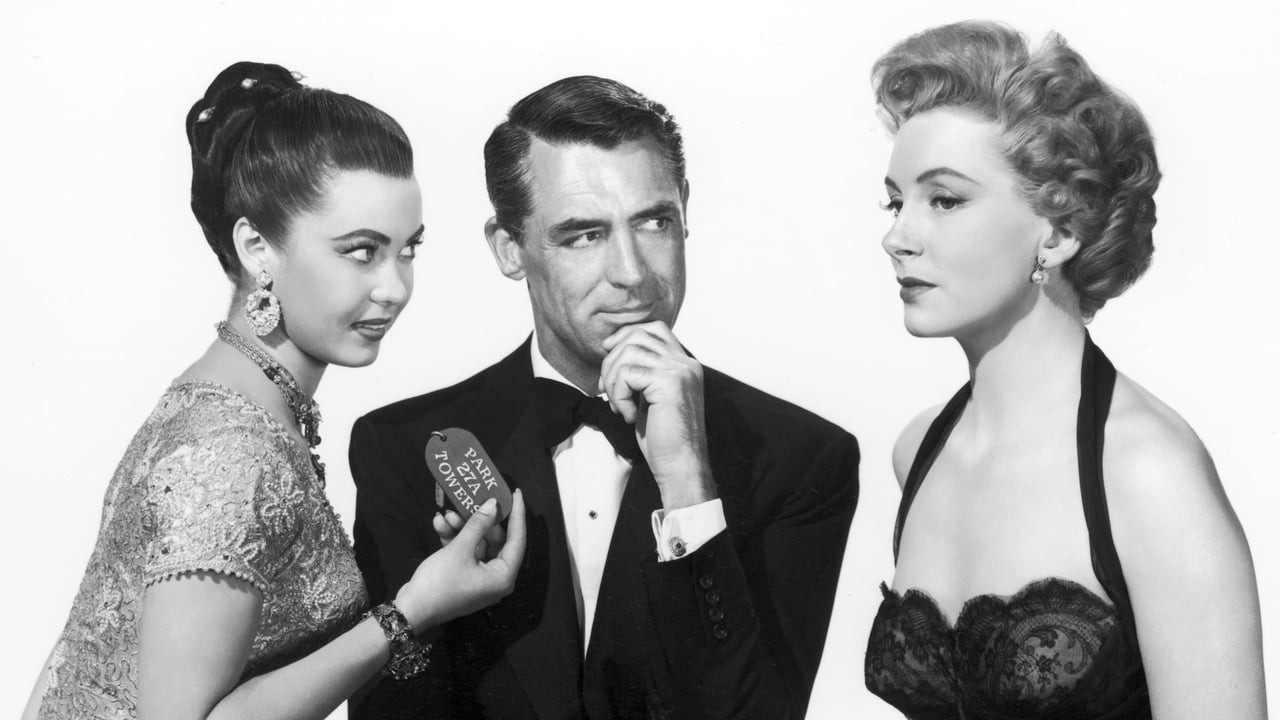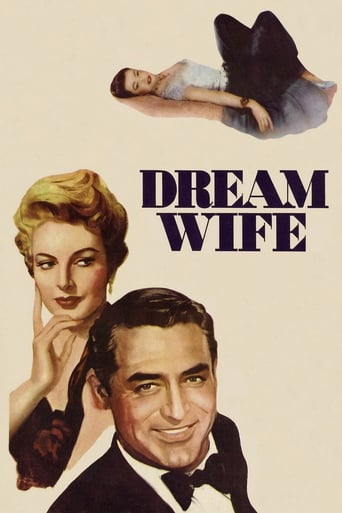

Only in the 1950s could a movie like Dream Wife be made! Cary Grant is engaged to strong, career-woman Deborah Kerr, but he expresses his desire for a more meek, stereotypically feminine companion. He breaks off the engagement and decides to marry Betta St. John instead. However, since Betta is a real princess, the State Department assigns Deborah to act as official chaperone between the two until the wedding!While the plot is pretty thin, the best part of this film is the banter between Cary and Deborah. They have fantastic comic timing together, and they reprised their pairing later in An Affair to Remember and The Grass is Greener. One of my all-time favorite lines comes from this film: the pair is arguing about all the things they hated about each other when they were a couple, complaints they're now allowed to voice since they're not on good behavior anymore. Cary says he always hated Deborah's perfume. "My perfume? But you always used to ask me to put it on!" Deborah exclaims. He replies, "You always wore it! What was I supposed to do, ask you to take it off?" If you're laughing, rent the hilarious The Grass is Greener. Dream Wife has a few funny lines, but it probably won't end up being your favorite old movie.
... View MoreNo record of copyright, though allegedly copyrighted in 1953 by Loew's Inc. A Metro-Goldwyn picture. New York opening at the Rivoli: 29 July 1953. U.S. release: 19 June 1953. U.K. release: 13 July 1953. Australian release: 5 August 1953. 99 minutes.SYNOPSIS: Clemson Reade, who wants a wife in the home, not in business, breaks with Effie, a State Department official who is too busy with an oil crisis to have time for matrimony. Remembering a comely princess, Tarji, whom he met on a trip to Bukistan and the fact that she had been schooled from birth in the art of pleasing men, Reade proposes via cable. Because of the oil situation, the State Department steps in and assigns Effie to see that her ex-fiancé sticks to protocol in his new courtship. The princess comes to the United States, but the feminine craft of Effie soon has Tarji figuring that emancipation is more fun than being a dream wife.COMMENT: Whatever promise this one-joke romantic comedy may have had, is negated by a conventional plot and strictly routine direction - this was the first film screenwriter Sidney Sheldon (Annie Get Your Gun, Anything Goes) directed, the first of two, the other being The Buster Keaton Story, the direction of which has even less to commend it than Dream Wife has. Doubtless Cary Grant (Sheldon was involved in the writing of Bachelor and the Bobbysoxer) had something to do with the assignment of Sheldon to this pic. Be this as it may, the direction is as stolidly unimaginative as can be, and whatever humor was in the original screenplay has been effectively smothered by Sheldon's heavy handling. Deborah Kerr, in some stunning Helen Rose costumes, looks absolutely ravishing and while she has the best of everything - clothes, camera angles, coiffure - Betta St John is also allowed to make some impression as the princess; but the two other attractive young lasses in the cast, Patricia Tiernan as Miss Kerr's secretary and Mary Lawrence as Mrs Malvine get hardly a look-in. Walter Pidgeon has virtually nothing to do and Bruce Bennett has a miniscule role. Take-any-job Grant walks through the proceedings with his usual not-too-involved air. There are a few chuckles in the script. Trimmed to 75 or even 80 minutes, it might make passable entertainment. Production values are moderate. Miss Kerr gets the lion's share of behind-the camera attention.
... View MoreDirected by Sidney Sheldon, who wrote the screenplay with Herbert Baker and Alfred Lewis Levitt, this late screwball, flat sex farce reunites actor Cary Grant with writer Sheldon, who'd won an Academy Award on his only nomination for The Bachelor and the Bobby-Soxer (1947) in their only other collaboration. That's just one of the reasons that make one feel that this comedy could have been better, another is its veteran cast that includes Deborah Kerr and Walter Pidgeon.As it is, the storyline incorporates dated male and female gender roles in a way that's infrequently funny and more often silly. What begins as a promising, although greatly simplified look at the primitive wants and needs of each sex, devolves into a less than amusing review of old stereotypes. The film did receive an Academy Award nomination for its B&W Costume Design.When Clemson Reade (Grant) finally realizes that his fiancée Priscilla Effington's (Kerr) state department job takes too much of her time and will likely delay their wedding, he decides that he's had enough. When 'Effie' realizes that 'Clem' was expecting her to give up her job when she'd married him, they mutually agree to end their engagement. He then sends a telegram to the Khan (Eduard Franz) of oil rich Bukistan, where he'd just been on business, to see if can wed the royal Princess Tarji (Betta St. John), who's been trained since birth, as per their 3,000 year tradition, to care about nothing else but pleasing her future husband. The only trouble is, the state department's Walter McBride (Pidgeon, with a rather minor role) and his assistant Effie, have been negotiating a big oil death with the Khan. They intercept Clem's crude telegram and express their concerns about his plans messing up theirs. McBride then assigns Effie, who understands Bukistan's customs and speaks their language fluently, to act as a liaison between Clem and Tarji, who's father accepts the proposal of marriage.Of course, Tarji is perceived by Clem and his jealous co-worker friends (Les Tremayne, Bruce Bennett, and Richard Anderson's characters) to be the perfect wife, but her native customs (e.g. having to walk 3 feet behind him at all times, being unable to dine with him, etc.) and the fact that the wedding is scheduled 3 months in the future (during which the Princess's imposing bodyguard is to keep them from kissing one another), gives him second thoughts. Heavyweight boxing champion Max Baer's younger brother Buddy plays Tarji's bodyguard and, in the screwball tradition, Dan Tobin does his best "Franklin Pangborn", playing a befuddled hotel manager. So Clem asks Effie to help Tarji to become more sophisticated, or domesticated for U.S. customs, and of course his ex-fiancée is only too happy to educate the Princess about famous suffragettes and other early feminists. Effie's efforts help to undo 3,000 years of Bukistan culture in just 3 months! Meanwhile, Effie begins to see Clem's attraction to Tarji (or at least his ideal of a subservient wife), in a new light. When the now English speaking, yet still very naive Tarji goes out for a walk alone, she attracts men (including Steve Forrest) like flies. It doesn't take a genius to figure out where all this is leading and, in the end, the predictable is delivered.
... View MoreThis film is a fascinating look at our culture's post WWII attitude towards women and the Middle East. The movie showcases the big message of get-the-women-back-into-the-kitchen that followed the War. As for our attitude towards Islamic peoples, it IS all about oil as far as our government in this film is concerned. The rulers are fabulously wealthy and exotic, the portrayal of them and their customs betray Hollywood's gross ignorance of the peoples and the religion. The princess' dance (seductive and Martha Grahamish) in the opening scene says it all. The women in the court all wear short sleeves. No one bothered to find out anything about the religion, it would seem. The behavior of the 'Bakistanis' is made up only to create comic moments, no matter how inaccurate, unseemly or unrealistic.The plot is silly and implausible, but it's fun to watch Grant and Kerr in their first on screen performance.
... View More